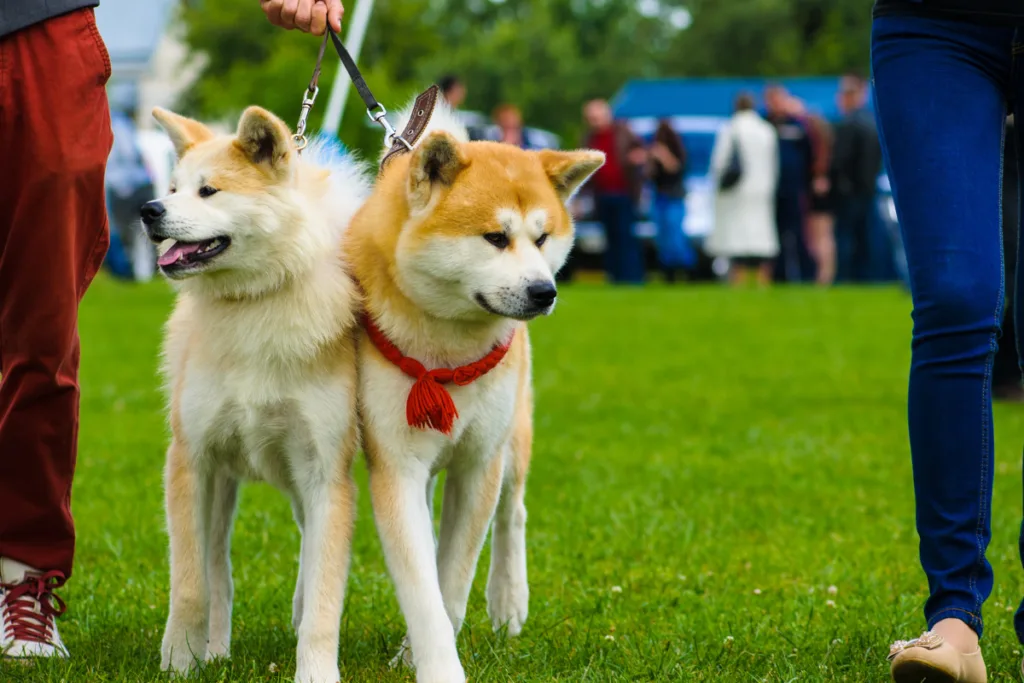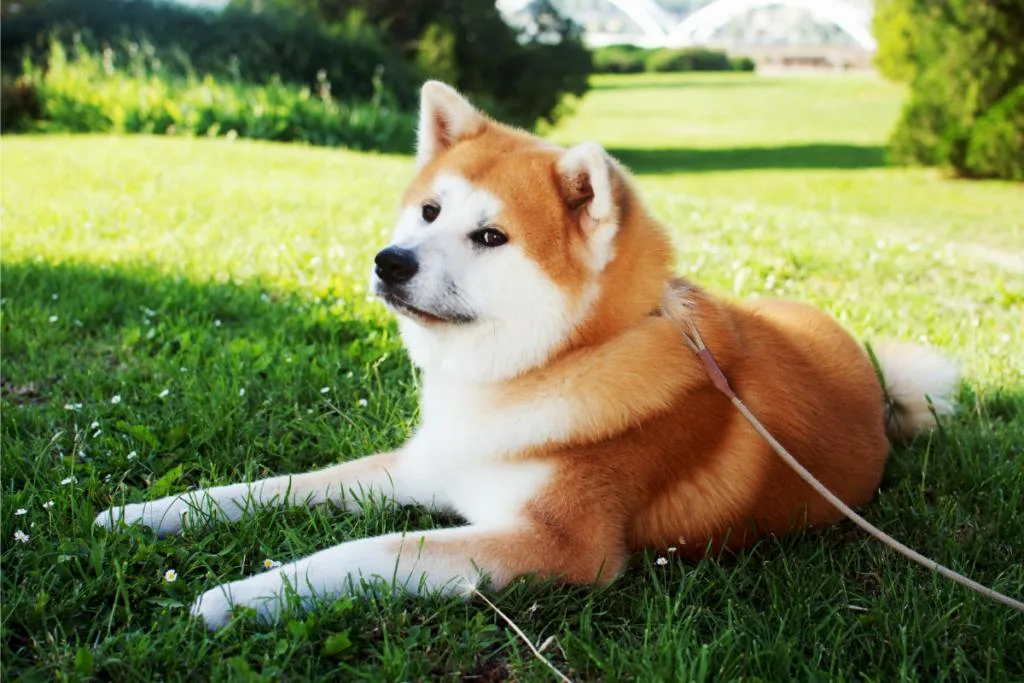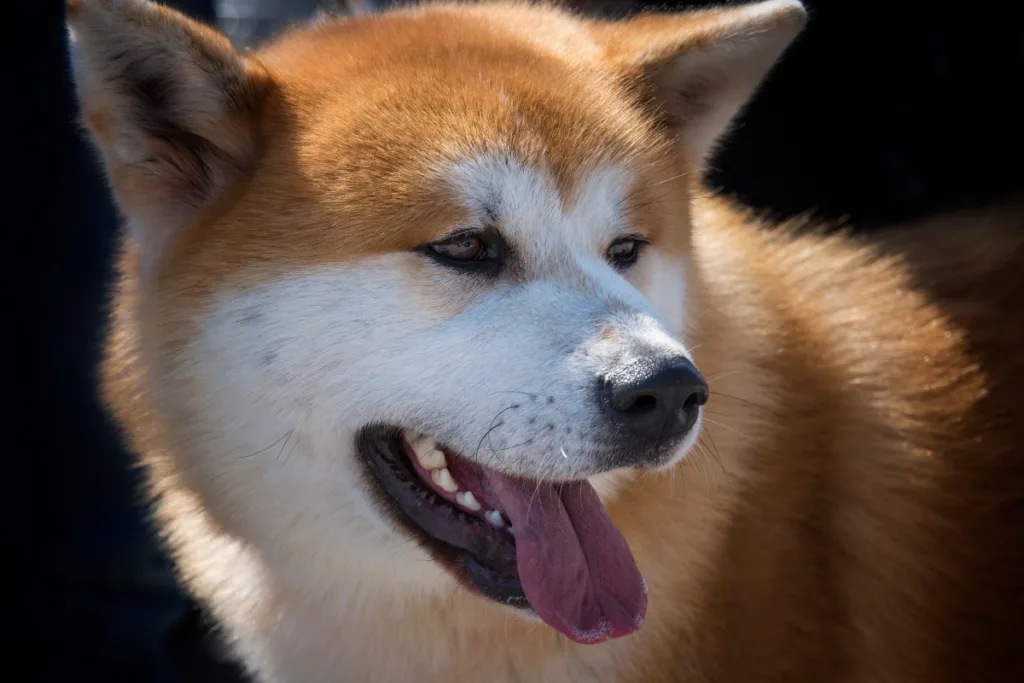Akitas are intelligent, good-natured dogs well-loved for their bushy tails, soft thick fur, fierce loyalty, and generally pleasant disposition, but a lot of dog lovers are quite wary about introducing them to their other fur babies at home.
Akitas are not good with other dogs because they can get aggressive and territorial, especially when it comes to other dogs of the same sex, and may attack when they feel jealous or threatened.
This article will talk about why Akitas are not good with other dogs, what you can do to make them more sociable, and the important precautions you always have to keep in mind whenever you take your Akita out in public and whenever they’ll be interacting with other dogs and animals.

Click Here to Jump to a Section
Are Akitas Friendly Toward Other Dogs?
Akitas are not friendly toward other dogs because they are known for being overprotective, and they will perceive as threats any unfamiliar dog that gets too close to them or anyone in their human family, and challenges their dominance.
Akitas are generally good-natured, especially when around their human families, and are known to be extremely loyal and protective.
However, they can easily get jealous, territorial, and aggressive when they feel that their dominance is being threatened.
In northern Japan where they originally came from, specifically from the prefecture of Akita (hence their name), they were first used by royal families and the nobility as guard dogs.
They were tasked to keep a constant watch on their human families and ensure that they are always safe and protected.
Akitas were trained to quickly discern danger and attack perceived aggressors to keep their wards safe.
Hence, it is in the Akita’s nature to guard and protect their humans and their private space and may attack at the first hint of danger, especially if they are not properly trained.
Here are some of Akitas’ dominant characteristics that will make you think twice about letting them mingle with other dogs:
Strong Prey Drive
In ancient Japan, Akitas were also originally bred for hunting, and even after decades have passed, they still have their natural hunting instincts.
This is why a lot of experts recommend that Akitas be put on a leash whenever they go out in public since they have the tendency to go searching and chasing after prey, especially smaller dogs.
When in an open space, you might see them sniffing the ground and settling down to survey the space, rather than jumping around and begging for playtime the way most dogs would probably react.
Smaller dogs, as well as smaller animals like squirrels, cats, and rabbits, may be put at risk if an unleashed or untrained Akita is around.
Independent

Akitas are also known for being smart, brave, and independent, and first-time Akita owners might feel a bit disappointed since they’re not as clingy and needy as other breeds.
They might seem reserved and aloof but they really just prefer being independent.
They do well with being the only fur baby in the house and may also respond well to being given tasks, such as fetching the paper every morning, bringing you your keys, or searching for items you might have misplaced.
Also, although they’re known to be fiercely loyal to their human families, it takes a lot of time for Akitas to develop these strong bonds.
They’re the same way toward other dogs (and animals) — it takes time for them to learn to trust another canine, so be extremely watchful when introducing them to a new friend.
A good trick for Akita puppies is to raise them with other dogs (or animals) from a very young age, so they’re able to build solid relationships over time.
When properly socialized with other dogs, keep in mind that they’re inclined to ensure that they keep their top-dog status, so experts say it’s best that they’re kept only with dogs of the opposite sex.
If you plan on getting an Akita, check out my article on whether you should get a pair of Akitas or just one from the onset. [Are Akitas Better in Pairs or By Themselves?]
Jealous
Since Akitas are capable of developing strong bonds with their human families, they like being around them all the time, and you might notice your Akita following you around inside the house since this is his way of offering you protection.
Your Akita might also get jealous when he sees you with another dog, especially if you’re being affectionate toward that dog.
Your Akita might react by showing signs of aggression, such as barking, digging, or growling, and might resort to attacking the offending dog if the situation isn’t neutralized at once.
Akitas thrive when they’re the only furry family member inside the house so they won’t have issues about asserting their dominance and feeling envious whenever you show affection toward other dogs (or animals).
Territorial
Akitas are highly territorial, especially around dogs of the same sex, because they see them as threats.
If another dog initiates a fight, expect your Akita to engage because they almost never back down.
They also have a tendency to attack dogs (or other animals) that encroach on their territory, so always properly introduce new dogs to your Akita and never let them just barge in even though they’re friendly.
Keep your Akita leashed if there is a chance he’ll be interacting with other dogs, and make sure the handler is confident, consistent, and strong enough to handle the Akita’s possible aggression.
Adult Akitas can weigh at least 100 pounds (45.36 kg) and typically possess extreme muscular power, so they can easily dominate and overpower you if you’re not mindful enough.
Akitas don’t respond well to harsh training and treatment, so make sure you’re firm yet respectful when handling your Akita, and he will acknowledge by treating you with the same level of respect.

Final Thoughts
Akitas are not good with other dogs because they quickly get jealous, are extremely dominant, and can easily feel threatened when in close proximity to other dogs and animals.
They might even see them as threats to their human family’s safety, so they might resort to attacking the perceived offender.
To improve their social skills, Akitas do best by being trained to interact with other dogs and animals from an early age so they can develop strong relationships over time.
An Akita’s aggressiveness toward other dogs can be tempered with proper training and early socialization.
